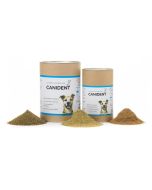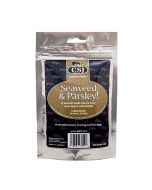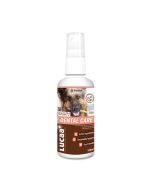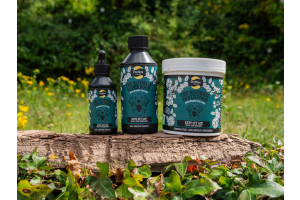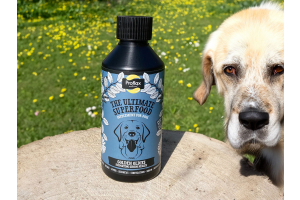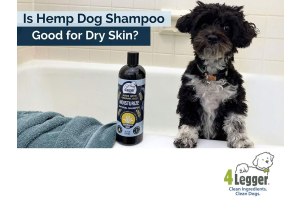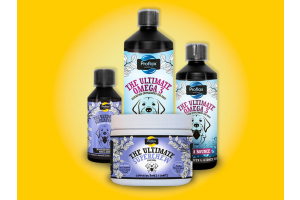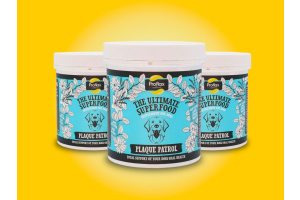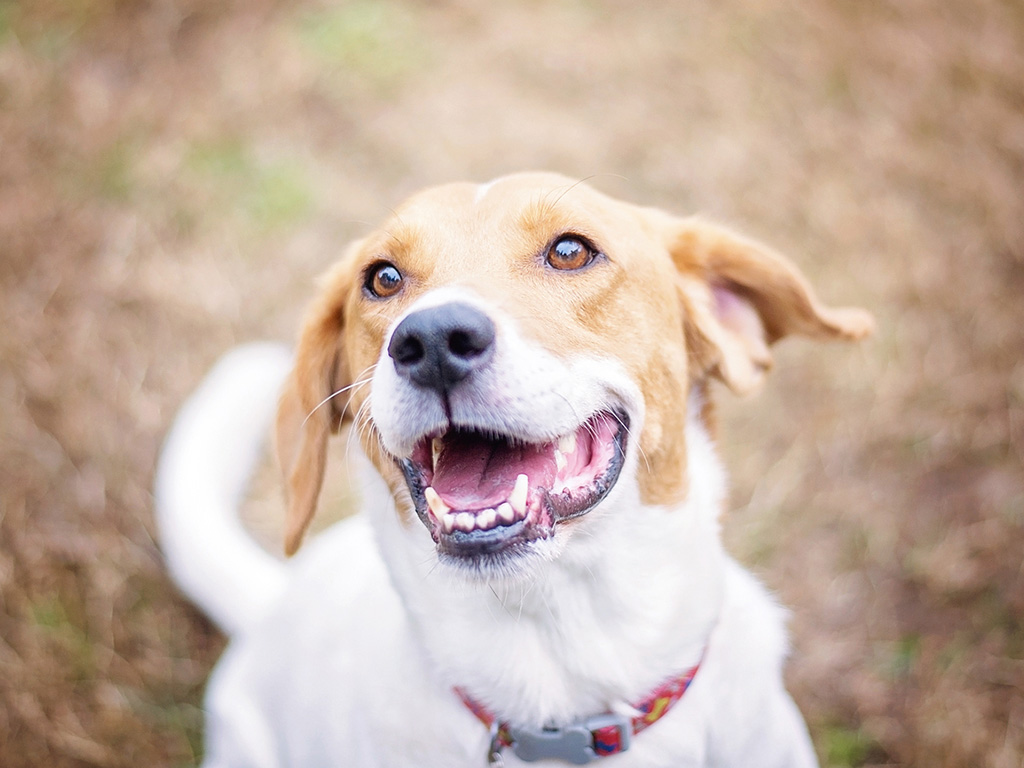
Dental hygiene for dogs and cats is essential for their overall health and well-being. Studies have found that an estimated 80% of dogs over the age of three have gum disease
The mouth is very important to animals as they spend their days not only eating and chewing but also …. grooming, removing insects from their coat and manipulating things. The mouth has a good blood supply and contains many nerves making dental issues a potential problem. If your pet has a sore mouth you may be unaware as they are unable to tell you about it!
Sometimes there are no signs at all that your pet is suffering from dental problems, but typical signs can include:
- Plaque (a biofilm which contains bacteria) and tartar/calculus (yellow-brown hard mineralised plaque) build-up on teeth
- Reddened tender inflamed gums resulting from tartar build-up which irritates and puts pressure on the gums and which if isn’t removed can build up under the gums causing them to recede from the teeth.
- Receded gums allow additional bacteria to become trapped, eventually leading to loose teeth and painful abscess development which destroys the root of the tooth.
- Bleeding from the mouth / gums.
- Bad breath
- Excessive salivation or drooling
- Altered behaviour such as chewing on one side, discomfort when chewing, possible loss of appetite, weight loss, not grooming.
Periodontal disease is the most common long term tooth and gum problem. This doesn’t develop overnight and may take many months or years. Should you notice any of the above symptoms, particularly where the gums look affected and there is behaviour change, you should seek veterinary advice. This may be from a qualified Veterinary Nurse at your local practice in the first instance. Some symptoms may, of course, be due to other related or unrelated problems.
Once some of these hard tartar deposits have been formed then they can only be adequately removed by your vet. You can then contribute to maintaining the health of your pet’s teeth and gums by promoting good dental hygiene, with appropriate dietary adjustment including feeding chews and toys that help clean teeth, and if possible, regular brushing and cleaning.
So how can you keep your pet’s teeth clean and healthy to prevent these problems?
Once some of these hard tartar deposits have been formed then they can only be adequately removed by your Vet. You can then contribute to maintaining the health of your pet’s teeth and gums by promoting good dental hygiene, with appropriate dietary adjustment including feeding chews and toys that help clean teeth, and if possible, regular brushing and cleaning.
Good oral hygiene is not just about preventing plaque and bad breath but it helps prevent other problems such as heart disease. Bacteria can enter the bloodstream through the breakdown of diseased gum tissue or when plaque has been disturbed. If the immune system is not robust enough, bacteria may reach the heart, causing damage to the heart tissues, especially the valves. Having strong teeth and healthy gums also means food will be chewed properly, so aiding digestion and contributing to overall good condition.
It is never too late to help prevent problems by adjusting the diet, adding appropriate chews and toys, and to start brushing your pet’s teeth.
You should ensure that you check the condition of your pet’s teeth on a regular basis. If you are not confident of what to look for, or even about looking into your pet’s mouth, consider calling into the local veterinary practice for a Vet Nurse to check them twice yearly in a young animal and more often in older animals or those prone to problems.
Diet
Your pet’s diet can play a significant role in the amount of tartar build up. You should aim to feed them a species-specific diet – ideally a raw diet complete with raw meaty bones or a fresh food diet that is not laden with carbohydrates and sugars that can promote unhealthy bacterial growth in the mouth.
Raw food which contains ground bone acts as a fine, gentle dental abrasive when chewed, helping to remove debris which may have stuck on the teeth. The raw meat also contains naturally occurring enzymes which help protect the gums and teeth. Starchy kibble can stick to the teeth, unlike raw food which doesn’t.
Chewing also plays a role in cleaning teeth and removing plaque and tartar. Size appropriate raw bones are a great option. Ensure your dog is supervised to minimise any risk and refrigerate between chewing sessions. NEVER feed cooked bones to your dog as they can splinter and cause serious damage and may cause constipation due to changes in the mineral content.
Supplements
There are supplements available with ingredients that support gum health and helping to soften plaque making it easier to be removed by the chewing actibity or brusing.
Products include Canident - a unique blend of Irish brown seaweeds. Their anti-microbial properties of this seaweed blend help to prevent the build up of plaque and tartar on dogs teeth, CSJ Seaweed & Parsley! a mix of Irish Seaweed and Parsley to aid your dog's oral health, Herbal Dog Co Plaque Protect for dogs - a fresh mix of seaweeds, marjoram and fennel seed to support your dog's gum health and helping to reduce tartar build up leaving fresh "kissable" breath, or Proflax Plaque Patrol which has been designed to combat plaque build up, promote healthy gums, keep teeth clean & strong and breath fresh. Formulated with 6 of the best herbal ingredients to support optimal oral health and to help with gingivitis and periodontal conditions including seaweed, calendula, thyme, decaff green tea, turmeric and parsley.
Also look at LUCAA+ Dental Spray a pet probiotic dental care spray to foster better dental health, protecting gum health and reducing plaque, tartar and bad breath. Enriched with beneficial ‘good’ probiotic bacteria, naturally sourced from plants, the helpful probiotics quickly restore healthy microflora balance to the mouth. They clean teeth and gums at a microbial level and inhibit the growth of harmful bacteria.
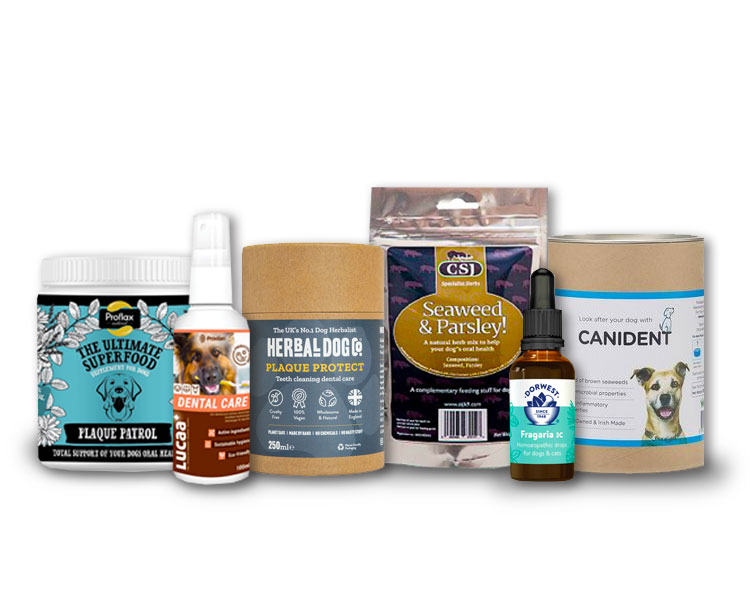
Chew Toys
Chew toys are not just for fun but also great for brushing teeth, as every time your dog chews they are brushing their teeth. However, look out for non-toxic “chew” toys to avoid your dog ingesting toxins and chemicals. Antlers and Chew Roots can also be another good option, as are natural dental chews. Playing with your dog with rope chews acts like dental flossing.
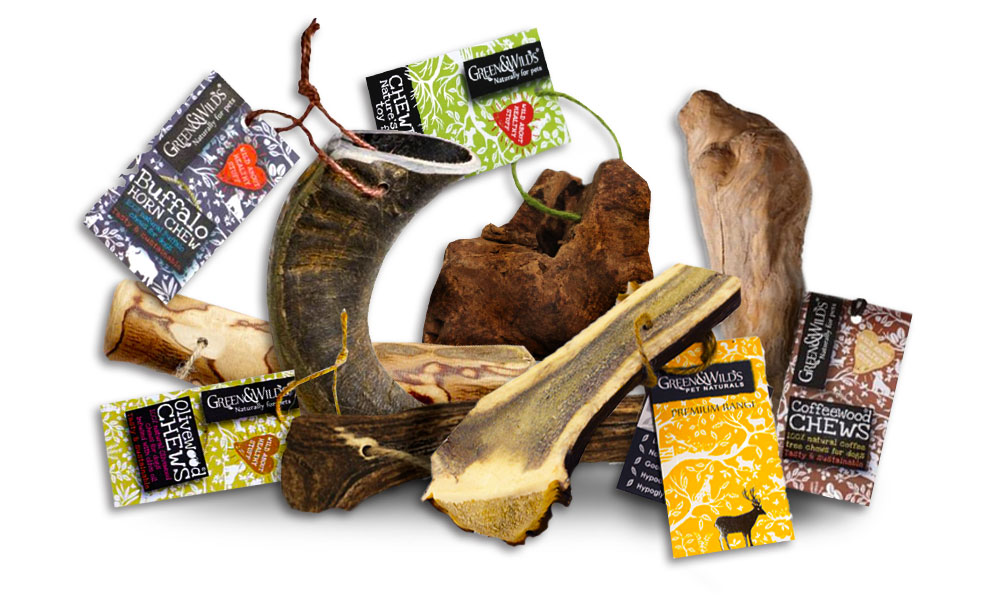
Another good effect from chewing, both toys and especially large bones, is the strengthening of neck, back and core body muscles, also the wearing down of dewclaws in particular which are often used to hold onto the items.
This is a great article by Dr Karen Becker on bones and chews for dogs. Read here.
Older pets and those with a history of liver, pancreatic or digestive upsets should not be given products with a high fat content, (in fact, best to be fat-free for pancreas problems) and also avoid any cereal and colouring additives which some products, especially treats, may contain. Supplements with seaweed extract such as Canident or CSJ Seaweed & Parsley may help soften plaque which can then be more easily removed by the chewing activity or brushing.
Dental Chew Sticks
Chew sticks can also be a great way of cleaning your pets teeth. We sell a great range of natural chew sticks to freshen your pets breath as well as containing natural abrasives to clean teeth and maintain healthy gums.
These tasty treats are perfect for fussy dogs who do not like having their teeth cleaned on a regular basis and can also be used as a training reward or snack.
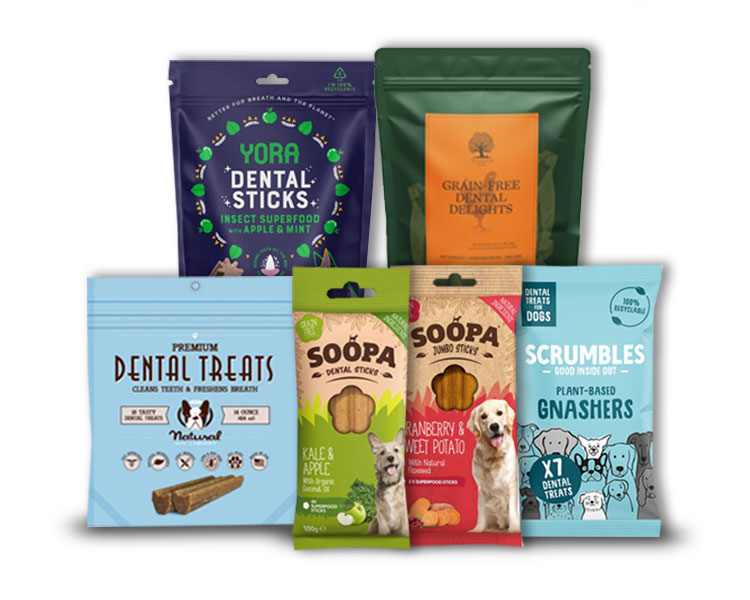
Brushing Your Pet's Teeth
An ideal way to ensure that tartar doesn’t form on your dog or cat’s teeth is to carry out regular brushing, ideally once a day. It is best if you start from an early so it becomes part of their normal daily routine.
Ensure your pet is relaxed, for example after a walk. Start off slowly at the beginning to build up trust and don’t force anything; start with only brushing some of their teeth and use your index finger rather than a toothbrush. You can dip your finger into something that your pet likes, for example bone broth, coconut oil or flavoured toothpaste.
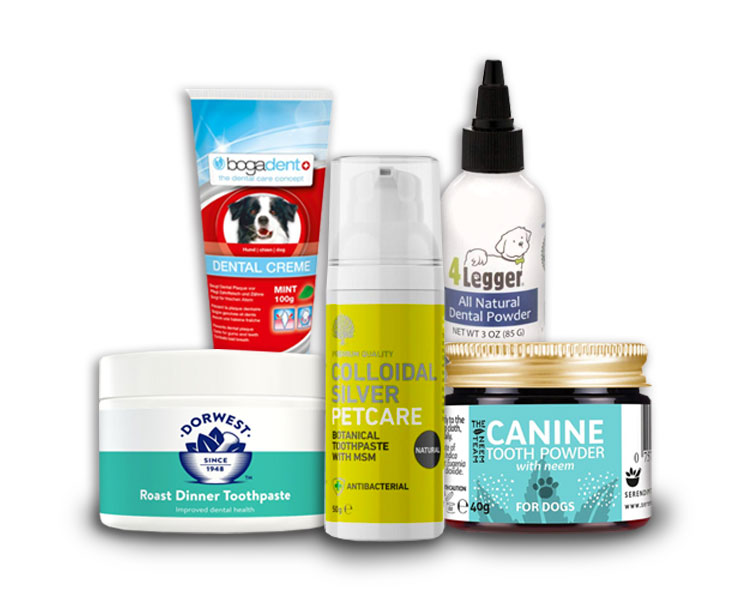
Once your dog or cat is comfortable with this try using something on your finger such as a micro-fibre anti-plaque finger to make this process easier and more effective. Start by gently rubbing the top front teeth and work your way to the front of the back teeth. Repeat the process for the bottom teeth. The tongue and saliva help keep the inside of the teeth clean.
Please note that many pets will not tolerate the intrusion of a brush or even a finger brush.
Keep sessions short and offer lots of praise and reward! Apply different pressures to the gums to see how your pet reacts. Then when your dog or cat is comfortable you can start to add a natural, pet dental gel and toothbrush. However we recommend to initially let them lick this off your finger until they get used to the flavour.
Finally, when you feel they are ready, progress to a finger brush and ultimately to using a soft, pet designed toothbrush, which is the correct size for their mouth. Clean in a circular motion focusing where the teeth and gums meet. Dip the brush in water as you brush to help rinse the plaque away.
NEVER use human toothpaste as it contains fluoride and sometimes xylitol which are both toxic to dogs and cats.
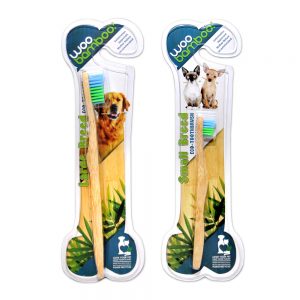
If brushing is not tolerated by your pet, then a good quality pet Oral Gel which can be smeared onto the gums or onto a treat after the meal, or even squeezed on top of the food or mixed with the food, especially dry food, will spread around the mouth and have some cleaning action, rather than nothing. Some treats are designed to be fed after meals for this purpose.
When looking for dental products for your pets make sure they only contain natural ingredients, such as neem oil, peppermint oil, rosemary oil and sage oil with their naturally antiseptic properties.
If you are interested, view our pet dental range.
Sources
Dr Karen Becker - Don’t Dismiss These 5 Signs of Pain from Your Pet
Dr Pitcarn’s Complete Guide to Natural Health for Dogs and Cats.
